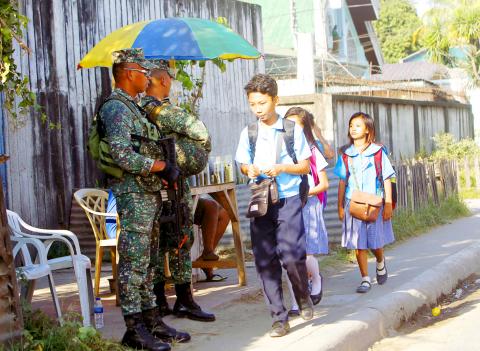Philippine President Rodrigo Duterte has signed legislation creating a new Muslim autonomous region aimed at settling nearly half a century of unrest in the south.
Presidential spokesman Harry Roque and another key aide, Bong Go, late on Thursday told reporters without elaborating that Duterte signed the bill creating the region, to be called Bangsamoro.
The autonomy deal, which has been negotiated for more than two decades under four presidents, was ratified earlier this week by both chambers of the legislature.

Photo: EPA
“This is to announce that the president has just signed the BOL into law,” Roque said in a cellphone message, referring to the Bangsamoro Organic Law.
The deal was negotiated with the Moro Islamic Liberation Front, the largest Muslim rebel group in the south, although about half a dozen smaller Islamic State group-linked radical groups remain a threat in the region.
Moro front chairman Al Haj Murad Ebrahim on Tuesday told a news conference that up to 40,000 fighters would be “decommissioned” if the autonomy deal is fully enforced.
The disarming would be done in batches based on compliance with the accord, with the final 40 percent of the guerrillas turning over their weapons once there is full compliance.
Six of the largest guerrilla camps were already being converted into “productive civilian communities” to help the insurgents return to normal life, Murad added.
Murad appealed to the international community to contribute to a trust fund to finance the insurgents’ transition from decades of waging one of Asia’s longest rebellions.
“We will decommission our forces, the entire forces,” Murad said, declining to immediately cite the number of weapons that “will be put beyond use.”
The Bangsamoro replaces an existing autonomous region and is to be larger, better-funded and more powerful. An annual grant, estimated at 60 billion to 70 billion pesos (US$1.12 billion to US$1.31 billion), is to be set aside for development.
Murad’s guerrilla force is the second to drop a demand for a separate Muslim state in exchange for autonomy. The Moro National Liberation Front forged a 1996 peace deal with the government that led to the current five-province Muslim autonomous region, which has largely been regarded as a failure.
Murad said it is crucial for the peace agreement to be fully enforced, citing how earlier failed attempts prompted some guerrillas to break away and form groups.
“We can roughly conclude that all these splinter groups are a result of the frustration with the peace process,” Murad said.

MAKING WAVES: China’s maritime militia could become a nontraditional threat in war, clogging up shipping lanes to prevent US or Japanese intervention, a report said About 1,900 Chinese ships flying flags of convenience and fishing vessels that participated in China’s military exercises around Taiwan last month and in January have been listed for monitoring, Coast Guard Administration (CGA) Deputy Director-General Hsieh Ching-chin (謝慶欽) said yesterday. Following amendments to the Commercial Port Act (商港法) and the Law of Ships (船舶法) last month, the CGA can designate possible berthing areas or deny ports of call for vessels suspected of loitering around areas where undersea cables can be accessed, Oceans Affairs Council Minister Kuan Bi-ling (管碧玲) said. The list of suspected ships, originally 300, had risen to about 1,900 as

Japan’s strategic alliance with the US would collapse if Tokyo were to turn away from a conflict in Taiwan, Japanese Prime Minister Sanae Takaichi said yesterday, but distanced herself from previous comments that suggested a possible military response in such an event. Takaichi expressed her latest views on a nationally broadcast TV program late on Monday, where an opposition party leader criticized her for igniting tensions with China with the earlier remarks. Ties between Japan and China have sunk to the worst level in years after Takaichi said in November that a hypothetical Chinese attack on Taiwan could bring about a Japanese

MORE RESPONSIBILITY: Draftees would be expected to fight alongside professional soldiers, likely requiring the transformation of some training brigades into combat units The armed forces are to start incorporating new conscripts into combined arms brigades this year to enhance combat readiness, the Executive Yuan’s latest policy report said. The new policy would affect Taiwanese men entering the military for their compulsory service, which was extended to one year under reforms by then-president Tsai Ing-wen (蔡英文) in 2022. The conscripts would be trained to operate machine guns, uncrewed aerial vehicles, anti-tank guided missile launchers and Stinger air defense systems, the report said, adding that the basic training would be lengthened to eight weeks. After basic training, conscripts would be sorted into infantry battalions that would take

DEEP-STRIKE CAPABILITY: The scenario simulated a PLA drill that turned into an assault on Taiwan’s critical infrastructure, with the launchers providing fire support Taiwan yesterday conducted this year’s first military exercises at Longsiang Base in Taichung, demonstrating the newly acquired High Mobility Artillery Rocket System’s (HIMARS) ability to provide fire support and deep-strike capabilities. The scenario simulated an attack on Penghu County, with HIMARS trucks immediately rolling into designated launch areas and firing barrages at the Wangan (望安) and Cimei (七美) islands, simulating the provision of fire support against invading forces. The HIMARS are supposed to “fire and leave,” which would significantly increase personnel and equipment survivability, a military official said. The drill simulated an exercise launched by the Chinese People’s Liberation Army (PLA) Eastern